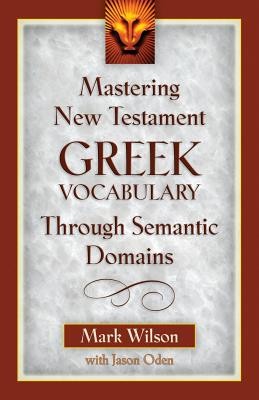
- We will send in 10–14 business days.
- Author: Mark Wilson
- Publisher: Kregel Academic & Professional
- ISBN-10: 0825441153
- ISBN-13: 9780825441158
- Format: 14.1 x 22 x 1.3 cm, minkšti viršeliai
- Language: English
- SAVE -10% with code: EXTRA
Mastering New Testament Greek Vocabulary Through Semantic Domains (e-book) (used book) | bookbook.eu
Reviews
Description
Basic to learning New Testament Greek is acquiring an adequate vocabulary. The traditional methods used for vocabulary building are based on memorization of frequency lists or cognate groups. Mark Wilson introduces Greek students to a method widely used today in general language learning--semantic domains, or categories. Wilson arranges the Greek words in ninety-three categories, including geographical objects and features, artifacts, body parts, people, linear movement, kinship, attitudes and emotions, communication, time, and moral and ethical qualities. He also includes frequency counts for every Greek word.
EXTRA 10 % discount with code: EXTRA
The promotion ends in 23d.14:20:46
The discount code is valid when purchasing from 10 €. Discounts do not stack.
- Author: Mark Wilson
- Publisher: Kregel Academic & Professional
- ISBN-10: 0825441153
- ISBN-13: 9780825441158
- Format: 14.1 x 22 x 1.3 cm, minkšti viršeliai
- Language: English English
Basic to learning New Testament Greek is acquiring an adequate vocabulary. The traditional methods used for vocabulary building are based on memorization of frequency lists or cognate groups. Mark Wilson introduces Greek students to a method widely used today in general language learning--semantic domains, or categories. Wilson arranges the Greek words in ninety-three categories, including geographical objects and features, artifacts, body parts, people, linear movement, kinship, attitudes and emotions, communication, time, and moral and ethical qualities. He also includes frequency counts for every Greek word.


Reviews